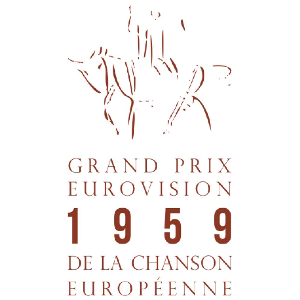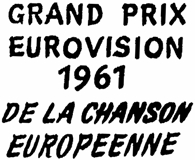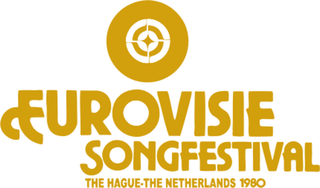
The Eurovision Song Contest 1959 was the fourth edition of the annual Eurovision Song Contest, held on Wednesday 11 March 1959 at the Palais des Festivals et des Congrès in Cannes, France, and hosted by French television presenter Jacqueline Joubert. Organised by the European Broadcasting Union (EBU) and host broadcaster Radiodiffusion-Télévision Française (RTF), the contest, originally known as the Grand Prix Eurovision de la Chanson Européenne 1959, was held in France following the country's victory at the 1958 contest with the song "Dors, mon amour", performed by André Claveau.

The Eurovision Song Contest 1961 was the 6th edition of the annual Eurovision Song Contest. Once again, the contest was held in the French seaside city of Cannes, having also hosted the 1959 edition. Organised by the European Broadcasting Union (EBU) and host broadcaster Radiodiffusion-Télévision Française (RTF), the contest was again held at the Palais des Festivals et des Congrès on Saturday 18 March 1961, becoming the first contest to take place on a Saturday evening, a tradition that has continued ever since. The show was directed by Marcel Cravenne and again hosted by Jacqueline Joubert, who had also hosted in 1959.

The Eurovision Song Contest 1967 was the 12th edition of the annual Eurovision Song Contest. It took place in Vienna, Austria, following the country's victory at the 1966 contest with the song "Merci, Chérie" by Udo Jürgens. Organised by the European Broadcasting Union (EBU) and host broadcaster Österreichischer Rundfunk (ORF), the contest was held at the Großer Festsaal der Wiener Hofburg on 8 April 1967, becoming the first contest held in the month of April, and was hosted by Austrian actress Erica Vaal.

The Eurovision Song Contest 1980 was the 25th edition of the annual Eurovision Song Contest. It took place in The Hague, Netherlands, and was organised by host broadcaster Nederlandse Omroep Stichting (NOS) – which agreed to stage the event after Israel, having won in both 1978 and 1979, declined to host it for a second successive year – and the European Broadcasting Union (EBU). The contest was held at the Nederlands Congresgebouw on 19 April 1980 and was hosted by Dutch actress Marlous Fluitsma, although each song was introduced by a presenter from the participating nation.

Luxembourg has participated in the Eurovision Song Contest 38 times since its debut at the first contest in 1956. The nation participated in all but one event between 1956 and 1993, only missing the 1959 contest. After finishing among the bottom seven countries in 1993, Luxembourg was relegated and prevented from competing in 1994. The nation did not return to the contest in 1995, and would make no further appearances over the next three decades. The country returned to the event for the first time in 31 years in 2024, qualifying for the final.

France has participated in the Eurovision Song Contest 68 times since its debut at the first contest in 1956. France is one of only seven countries to be present at the first contest, and has been absent from only two contests in its history, missing the 1974 and 1982 contests. Along with Germany, Italy, Spain, and the United Kingdom, France is one of the "Big Five" countries that are automatically prequalified for the final, due to being the largest financial contributors to the European Broadcasting Union (EBU). France has won the contest five times.

"Tom Pillibi" is a song recorded by French singer Jacqueline Boyer with music composed by André Popp and French lyrics written by Pierre Cour. It was released as a single on 10 April 1960. It represented France in the Eurovision Song Contest 1960 held in London, winning the contest. It was covered by several artist including Julie Andrews.

"Nous les amoureux" is a song recorded by French singer Jean-Claude Pascal with music composed by Jacques Datin and French lyrics written by Maurice Vidalin. It represented Luxembourg in the Eurovision Song Contest 1961 held in Cannes, resulting in the country's first ever win at the contest.
France participated at the Eurovision Song Contest 1958, held in Hilversum, Netherlands. André Claveau with the song "Dors, mon amour" was selected as the nation's entry following an internal selection as well as a national final held on 7 February 1958. At the contest, held on 12 March 1958, France won with 27 points.
Yugoslavia participated for the first time at the Eurovision Song Contest 1961, held in Cannes, France.

Jean-Paul Mauric was a French singer, best known for his participation in the 1961 Eurovision Song Contest.
Belgium was represented by Bob Benny, with the song "September, gouden roos", at the 1961 Eurovision Song Contest, which took place on 18 March in Cannes, France. The song was chosen in the national final on 29 February. Benny had previously represented Belgium in the 1959 contest. Future Belgian entrant Jacques Raymond finished runner-up in the final.
France participated at the Eurovision Song Contest 1959, held in Cannes, France. Jean Philippe with the song "Oui, oui, oui, oui" was selected as the nation's entry. A national final was held to determine the song. At the contest, held on 11 March 1959, France came 3rd with 15 points.
Finland was represented by Laila Kinnunen, with the song "Valoa ikkunassa", at the 1961 Eurovision Song Contest, which took place on 18 March in Cannes, France. Finland was one of three countries making their Eurovision debut in 1961 and "Valoa ikkunassa" was chosen as the first Finnish entry at the national final organised by broadcaster Yle and held on 12 February.
France participated in the Eurovision Song Contest 2014 with the song "Moustache" written by Pierre Beyres, Kim N'Guyen, Lorent Idir and François Ardouvin. The song was performed by the band Twin Twin. The French broadcaster France Télévisions in collaboration with the television channel France 3 organised a national final in order to select the French entry for the 2014 contest in Copenhagen, Denmark. Three songs competed in the national final which took place during the France 3 programme Les chansons d'abord. On 2 March 2014, "Moustache" performed by Twin Twin was officially announced by France 3 as the winner following the combination of votes from a jury panel and a public vote.
This is a list of French television related events from 1961.
Germany participated in the Eurovision Song Contest 2017 with the song "Perfect Life" written by Lindsey Ray, Lindy Robbins and Dave Bassett. The song was performed by Levina. The German entry for the 2017 contest in Kyiv, Ukraine was selected through the national final Unser Song 2017, organised by the German broadcaster ARD in collaboration with Norddeutscher Rundfunk (NDR). The national final took place on 9 February 2017 with the winner being selected through four rounds of public televoting. "Perfect Life" performed by Levina was selected as the German entry for Kyiv after gaining 69% of the votes in the fourth round.
Switzerland participated in the Eurovision Song Contest 2018 with the song "Stones" written by Corinne "Coco" Gfeller, Stee Gfeller and Laurell Barker. The song was performed by the duo Zibbz. The Swiss entry for the 2018 contest in Lisbon, Portugal was selected through the national final ESC 2018 – die Entscheidungsshow, organised by the Swiss broadcaster Swiss Broadcasting Corporation. Songwriters that were interested in entering the Swiss national final had the opportunity to apply during a submission period organised by SRG SSR. Six entries were selected to advance to the televised national final, and the six finalists performed during the national final on 4 February 2018 where a combination of international jury voting and public voting ultimately selected "Stones" performed by Zibbz as the winner.
France participated in the Eurovision Song Contest 2021 with the song "Voilà" written by Barbara Pravi, Lili Poe and Igit. The song was performed by Barbara Pravi. The French broadcaster France Télévisions in collaboration with the television channel France 2 organised the national final Eurovision France, c'est vous qui décidez ! in order to select the French entry for the 2021 contest in Rotterdam, Netherlands. Twelve songs competed in the national final where the winner was selected over two rounds of voting. In the first round, eight entries were selected to advance to the second round: seven entries selected a public vote and one entry selected by a ten-member jury panel. In the second round, "Voilà" performed by Barbara Pravi was selected as the winner following the combination of votes from a ten-member jury panel and a public vote.
France participated in the Eurovision Song Contest 2022 in Turin, Italy, with "Fulenn" performed by Alvan and Ahez. The French broadcaster France Télévisions organised the national final Eurovision France, c'est vous qui décidez ! in order to select the French entry for the 2022 contest. Twelve songs competed in the national final on 5 March 2022, where the winner was selected over two rounds of voting.








